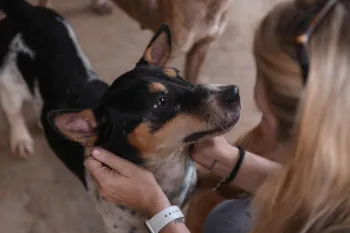KUPANG, NTT, Indonesia― Government officials, veterinarians, NGOs, academics and community representatives from Nusa Tenggara Timur (NTT) in southern Indonesia gathered in the provincial capital Kupang for the World Rabies Day and Workshop NTT 2025 event. Under the theme “Act Now: You, Me and the Community”, participants met to strengthen collaboration in eradicating rabies, tackling the dog meat trade and advancing animal welfare in East Nusa Tenggara.
East Nusa Tenggara is known globally for its world-class tourism destinations; however, rabies continues to be a persistent challenge. The deadly zoonotic disease is transmitted primarily through dog bites and as NTT is a dog meat trade hotspot, there is a very high risk of spreading the virus through this mass movement of dogs. Despite previous interventions, rabies remains a serious public health issue due to barriers to progress such as limited dog vaccination coverage, logistical challenges in remote areas and low public awareness.
Experts who gathered for the World Rabies Day workshop emphasized the urgent need for stronger policies, sustainable funding and greater community participation as well as reinforced commitments from all sectors to eradicate rabies and promote animal welfare as a central component of public health strategies.
This year’s program featured the launch of the Better Animal Welfare, Healthier Communities NTT 2025 Program, alongside the training of veterinarians and vaccinators in the use of a smart phone app created by Humane World for Animals (formerly known as Humane Society International), a digital tool designed to track and improve rabies vaccination coverage and animal health monitoring. A key milestone of the day was the unveiling of the co-organizers’ logo symbolizing the unity of all those involved in the fight against rabies and the promotion of animal welfare.
Indonesia’s illegal dog meat trade poses a direct threat to rabies elimination efforts. The movement and slaughter of unvaccinated dogs for human consumption is not only cruel but also facilitates the spread of rabies across districts and islands by bypassing and undermining disease surveillance and bringing infected dogs into previously rabies-free areas, thereby creating new hotspots of rabies infection. Dog meat trade thieves also remove vaccinated dogs from communities, breaking down ‘herd’ immunity achieved when 70% of dogs are vaccinated in a given area, which is essential for the safety of dog populations and the people they live alongside.
Julie Sanders, ending dog meat principal at Humane World for Animals, said: “The dog meat trade jeopardizes not only animal welfare but also community safety, human health and vital tourism because it exposes both locals and visitors to heightened rabies risk. The government’s goal of making NTT a rabies-free province by 2030 is completely undermined for as long as the dog meat trade continues. We need provincial bans, strong enforcement, public education, community engagement and robust vaccination. Our Humane World for Animals smart phone app will empower veterinarians and vaccinators with real-time data and tools to improve vaccination coverage which will be a game-changer for rabies control in NTT.”
The event was organized by JAAN Domestic Foundation and Humane World for Animals, in collaboration with the Ministry of Agriculture, NTT Provincial Government, NTT Animal Health Department, Natha Satwa Nusantara Foundation and Nusa Cendana University.
A spokesperson for JAAN Domestic Foundation said: “Rabies is not just a veterinary issue, but a community health and tourism issue. Ending the dog meat trade is essential to protect both people and animals. The World Rabies Day and Workshop NTT 2025 marks a significant milestone in East Nusa Tenggara’s fight against rabies. The province is taking a decisive step toward a rabies-free future. Together, under the spirit of “Act Now: You, Me and the Community,” East Nusa Tenggara is building a healthier, safer and more compassionate society.”
Emanuel Melkiades Laka Lena, Governor of Nusa Tenggara Timur, said: “As Governor, I reaffirm our commitment to making East Nusa Tenggara rabies-free. Collaboration between government, academia, NGOs and communities is the only way forward.”
The Animal Health Department highlighted the need for stronger veterinary infrastructure, while the Directorate of Veterinary Public Health stressed alignment with the national strategy to eliminate rabies by 2030. A representative of Nusa Cendana University said they underscored the role of education and research, and the Natha Satwa Nusantara Foundation reminded participants that animal welfare and rabies control are inseparable from public health and community compassion.
The ultimate goal of the World Rabies Day and Workshop NTT 2025 is to achieve measurable reductions in rabies cases across East Nusa Tenggara in the coming years. By aligning rabies control with animal welfare principles and eliminating practices such as the dog meat trade that spread the disease, the province envisions healthier communities, safer tourism destinations and a compassionate society where humans and animals coexist in harmony.
ENDS
